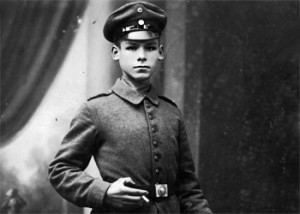
My grandfather going to war in 1915
My daughter spent weeks practicing “Advance Australia Fair,” “Eternal Father,” “Victors’ March” and “Waltzing Matilda” for her band’s performance at her school’s ANZAC Day ceremony. However, she came away from the ceremony angry and disappointed. What angered her was the invited speaker’s account of the First World War. The invited speaker, the president of the local RSL, explained Gallipoli as follows: the ANZACs had stood up to “the awful Germans” because “the awful Germans” were bullies and “we Australians don’t like bullies, do we?”
The audience’s understanding of 20th century history is as yet rather hazy and somewhat simplistic. Furthermore, the audience included a number of patriotic little Australian kids of German and Japanese descent. In this context, an account of Australian military history as a series of fights against German and Japanese villains is insensitive and was bound to make them feel excluded. However, what struck me, as the adult observer, was how extraordinarily narrow and exclusive the ANZACs and all the men and women of the Australian Defense Forces are actually conceived. It’s a cast of characters that not only excludes Germans and Japanese but anyone with a migrant background. When the speaker asked “Hands up if you have fathers or grandfathers who served in times of conflict to defend our freedom?” most hands in the assembly went up. Guess whose hands didn’t go up? As far as I could tell, the fault line between hands up or not coincided quite neatly with being of Anglo-Celtic descent or not. Those with their hands up were then told how proud they must be of their families.
And where does that leave the kids who didn’t put their hands up (aka kids of migrant backgrounds)? NOT PROUD of their families, obviously. Making children feel ashamed of their families, loved ones and backgrounds is horrible. To do so under the guise of fostering a national sense of identity is pernicious.
The message of that ANZAC day ceremony was pernicious in another way, too. Presumably, to make it all more “relevant” for the children, the invited speaker then went on to tell the story of James Martin, the youngest Australian soldier known to have died in WWI at age 14. Only two years older than the oldest children in the audience, the speaker exhorted the audience to take pride in this boy who “died so that we could be free.” I thought the story of this misguided child-soldier who lost his life unnecessarily (he didn’t even die in battle but of typhoid) was an extremely sad one. That he should be held up as a role model for today’s children is outrageous.
Later that day, I took my daughter to look at a picture of my grandfather going to war for Germany in 1915, aged 16: another fresh-faced, innocent and misguided boy whose life was ruined by the war. There are many ways to honor the memory of the lost generation who became canon fodder in WWI. Blathering about pride in child soldiers and sowing a sense of exclusion and divisiveness in the next generation is not one of them.






 This work is licensed under a
This work is licensed under a
The use of plural pronouns, we, our is so recurring and so misleading especially in nationalist discourses and people are often taken in by these words. It is shameful to glorify war not peace.
While talking to two teachers during my data collection in mountainous region of Pakistan on Pak-Afghan border I discovered how deeply ingrained the word we was in the minds of these people. I was telling them that there were minority sects of Islam and they were muslims by their own rights and they were saying that we were only muslims because we follow the right principles and we are the true followers of prophet Muhamad. I really could not understand their meaning of we and our
Thanks for pointing out a crucially important subject of nationalistic discourses.
Khan
After arriving in Australia from Japan in 1992, I remember being warned by my relative not to go out on ANZAC Day. This warning came from the fact that a group of kids threw rotten eggs at him on the street in the previous year. They don’t like us [Japanese], and their hatred intensifies on ANZAC Day”. I took that advice and never went out on ANZAC Day. A few years later, my ex-boyfriend, a carpenter working for the Australian military, wanted me to attend a dawn service, and an ANZAC lunch on the military compound in Canungra, QLD. Contrary to my fear that my presence would ruin their day, I was greeted by many officers, who seemed genuinely pleased about Australia’s improved relationship with Japan. Migrants like ourselves have many stories to tell about this special day as well as our ancestors’ lives that were equally tragically affected by the wars. It’s important that these are shared to build an inclusive ANZAC Day and multicultural Australia. Thanks Ingrid for initiating this.